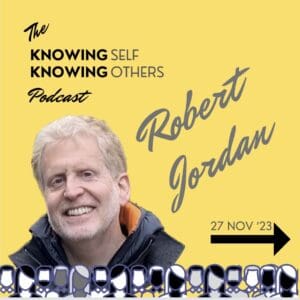It had such a good conversation with Robert Jordan in ep 41 of The Knowing Self Knowing Others Podcast about self-aware leadership, self-awareness and leadership styles!
Robert is a successful entrepreneur who found his passion when the World Wide Web really took off. With the growth of online access, his business soared and he earned a place on the prestigious Inc 500 list. After a stint in publishing, Robert took on the unconventional role of interim CEO, showcasing his diverse skills and adaptability. He later set up a recruitment agency for interim role and developed the FABS leadership assessment.
I’m really looking forward to sharing the episode with you. Here are some of my top takeaways and a few reflective questions for you to think about…

Takeaway 1:
Self-awareness is crucial for effective leadership. Understanding one’s own strengths, weaknesses, and leadership style allows leaders to make informed decisions and adapt their approach to different situations. It also helps them to better understand and connect with their team members.
Question to reflect on: How self-aware do you feel you are as a leader? What steps can you take to increase your self-awareness?
Takeaway 2:
Great leaders possess expertise in their field, strong collaboration skills, and a sense of accountability. These three traits work together to drive success. Expertise allows leaders to make informed decisions, collaboration skills foster teamwork and innovation, and accountability ensures that leaders take ownership of their actions and outcomes.
Question to reflect on: How can you further develop and leverage these three traits to enhance your leadership effectiveness?
Takeaway 3:
Lack of self-awareness can lead to leadership failures. When leaders are unaware of their blind spots or the impact of their actions, it can lead to poor decision-making, ineffective communication, and a toxic work environment. It is important to actively seek feedback, listen to different perspectives, and continuously work on self-improvement.
Question to reflect on: What steps can you take to actively seek feedback and gain insights into your blind spots as a leader?
Takeaway 4:
Different leadership styles have their own challenges and require self-awareness to navigate effectively. The Fixer, Artist, Builder, and Strategist styles each bring unique strengths and weaknesses to the table. Understanding one’s own style and being aware of how it impacts interactions and decision-making is crucial for effective leadership.
Question to reflect on: What is your dominant leadership style? How does it influence your approach to leadership challenges? Take the FABS leadership assessment
Takeaway 5:
Leadership is not limited to the business world. It is a skill that can be applied in various contexts, such as nonprofit organisations and community initiatives. The principles of self-awareness, expertise, collaboration, and accountability are relevant across different domains. Leaders in any setting can benefit from understanding their strengths and weaknesses, collaborating with others, and taking ownership of their actions.
Question to reflect on: How can you apply your leadership skills and principles in different areas of your life beyond the workplace?
It was a really good conversation and we laughed a lot. Check it out!
Looking forward to having you on my learning journey!

